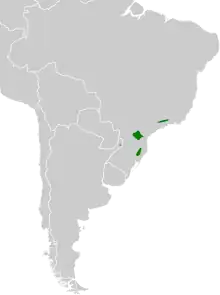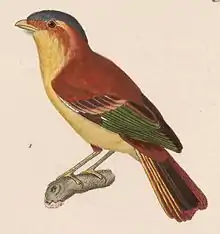| Black-capped piprites | |
|---|---|
_01.JPG.webp) | |
| male at Campos do Jordão, São Paulo state, Brazil. | |
.JPG.webp) | |
| A female at Campos do Jordão, São Paulo state, Brazil. | |
| Scientific classification | |
| Domain: | Eukaryota |
| Kingdom: | Animalia |
| Phylum: | Chordata |
| Class: | Aves |
| Order: | Passeriformes |
| Family: | Tyrannidae |
| Genus: | Piprites |
| Species: | P. pileata |
| Binomial name | |
| Piprites pileata (Temminck, 1822) | |
 | |
| Synonyms | |
|
Piprites pileatus | |
The black-capped piprites (Piprites pileata), also known as the black-capped manakin, is a species of suboscine passerine. It has traditionally been placed in the Tyrannidae.
It is found in Atlantic forest, especially with Araucaria angustifolia, growing in highlands of south-eastern Brazil and north-eastern Argentina (Misiones only). Until the recent rediscovery in Argentina, the only confirmed record for that country was a specimen taken in 1959. It is generally rare and local, and therefore considered vulnerable by BirdLife International. It is known from a number of protected areas, including the Itatiaia National Park in Rio de Janeiro, and Campos do Jordão State Park in São Paulo.

Piprites pileata; illustration 1838
References
- ↑ BirdLife International (2020). "Piprites pileata". IUCN Red List of Threatened Species. 2020: e.T22701205A153682590. doi:10.2305/IUCN.UK.2020-3.RLTS.T22701205A153682590.en. Retrieved 16 November 2021.
External links
This article is issued from Wikipedia. The text is licensed under Creative Commons - Attribution - Sharealike. Additional terms may apply for the media files.
